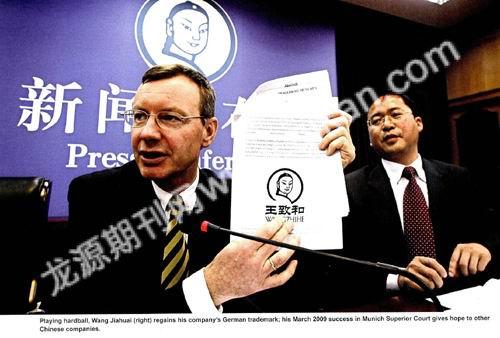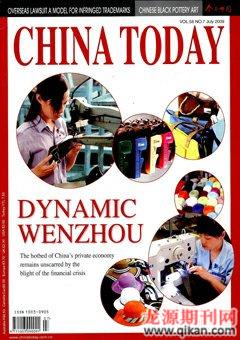Wangzhihe:Overseas Lawsuit a Model for Infringed Trademarks
LU RUCAI
Wangzhihes win is a declaration of the companys resolution to protect its rights by means of the law, thereby decreasing the likelihood of future infringements.
AFTER a 27-month lawsuit, Wang Jiahuai, general manager of Beijing Wangzhihe Food Group, recently won his trademark-infringement lawsuit against a German supermarket. Wangs case has generated much media interest since late April, and his success has provided a confidence boost for many other Chinese companies who face the same problem.

Time-honored Trademark Infringed
Established in 1669, Wangzhihe is a household brand in China, its preserved beancurd a life necessity for many people. The companys sales amounted to RMB 729 million in 2008.
Beginning in 2000, Wangzhihe started to explore overseas markets, soon forming stable customer bases in the U.S., Canada, and other countries with Chinese populations. But an unexpected problem arose in June 2006. Wang Hongqing, the companys trademark lawyer, found “Wangzhihe” had already been registered in Germany by Okai, a supermarket selling goods imported from China.
“As they had already registered ‘Wangzhihe, we couldnt sell any products in Germany, or we would be accused of trademark infringement,” said General Manager Wang. “In that case, our products might be destroyed, which would be a nightmare.” Furthermore, Okai would probably produce goods using his brand name.
“Working with the idea that ‘harmony is most precious, we sent a lawyers letter to ask them to give back the trademark in Germany.” As general manager of a company immersed in traditional culture, Wang Jiahuai has always reiterated the idea of harmony. However, he didnt get any response. The company finally decided to sue Okai in Germany to retrieve its intellectual property.

“When we made the decision, we knew there was no question about our success. The infringement should be punished.” On January 26, 2007, the Munich Local Court accepted and heard the case. The first judgment was made ten months later, forbidding Okai to use the trademark “Wangzhihe” in Germany without permission, and repealing the trademark Okai had preemptively registered.
“Once the trademark Okai registered was repealed, Wangzhihes application could be approved.” The news made Wang Jiahuai and Wang Hongqing very excited. They went all the way to Germany for the judgment.
But things didnt go as smoothly as they expected. Okai appealed to the Munich Superior Court on February 25, 2008. “After careful analysis, we concluded that Okai was stalling for time, even though they knew the chances of winning were slim.”
Worth the Effort
At 9 am Munich time on April 23, 2009, the Munich Superior Court reached a decision: Okai should not use “Wangzhihe” without permission and should remove its trademark, otherwise it would be fined 250,000 euros and the person in charge punished with a six-month prison term.
“It was a threat of quite severe punishment,” says Wang Jiahuai. The main aim for his company – preventing Okai using their trademark and repealing Okais registration – had been achieved.
Infringements involving Chinese enterprises occur much more often now that they are moving into overseas markets. But few use the law to protect their rights. One of the reasons is the cost of bringing a lawsuit. But Wangzhihes big win could inspire other companies, says Wang Jiahuai.
During the two year lawsuit, the biggest expense was the German lawyers retaining fee. Most of the preparation was done by Chinese lawyers and the company itself, which saved a large sum of money. “The fee we paid to the German lawyer totaled 20,000 euros, which we could easily afford.”
“Cost is not the only factor we take into account,” added Wang. “What weve obtained is worth far more than the costs.” Wangzhihes win is a declaration of the companys resolution to protect its rights by means of the law, thereby decreasing the likelihood of future infringements.
Besides Wangzhihe, six other mainland food company trademarks, like Baijia vermicelli and Qiaqia melon seeds, have been preemptively registered by Okai. “The other companies hadnt sued yet, but they supported Wangzhihes action.” In 2007, Qiaqia, Baijia and another two infringed companies provided statements claiming that Okai had used their registered trademarks without permission.
Culture Shocks
“Communication with the German lawyer was kind of difficult,” Wang Jiahuai recalled. It wasnt easy to make German lawyers and judges understand the influence of this brand in China. “So I told the lawyer Wangzhihe is the Mercedes and BMW of Chinese dining tables.”
Despite the obvious differences in ideology and culture, Wang Jiahuai believed, “There was no impassable gulf of communication based on the rules of the corporate game” where denunciations of infringements and illegal activities were concerned.
As for Okais claim that the Wangzhihe logo was simply a common image of ancient Chinese soldiers, Wangzhihe needed to prove this was absurd. “We found samples of ancient soldiers clothing, plaits and hats and made a comparison with the logo,” explained Wang. “The hat in the logo was definitely used by scholars in ancient China.”
Things that are common knowledge in China needed to be explained in detail in a trans-national context. “It was helpful for them to know and understand Chinese culture,” said Wang.
Wolfgang Festl-Wietek, the German lawyer, expressed his respect to the company for using the law to retrieve their trademark.
A Long Way to Go
Just before World Intellectual Property Day on April 26, the State Administration for Industry and Commerce published data showing that more than 2,000 Chinese trademarks have been preemptively registered in foreign countries since the 1980s. Cases included the Tong Ren Tang Pharmacy and Goubuli stuffed-buns, resulting in losses of up to RMB 1 billion annually.
“Chinese enterprises dont have a clear understanding of intellectual property when entering overseas markets,” cautioned Wang Jiahuai. In 2008 alone, foreign companies applied for 17,000 trademarks in China through the Madrid Agreement for International Registration of Trade Marks, compared to only 2,000 Chinese applications abroad.
As a time-honored company, Wangzhihe has registered in over 40 countries and regions, and sells products in over 20. Attaching unprecedented importance to overseas markets, the company set up a special department to handle international trade affairs. “With a history of more than 340 years, we think its important to protect our legacy.”
Wangzhihe produces only traditional foods, but Wang Jiahuai is confident of a good overseas performance. “In this industry, good performance is not decided by track record. As long as humans exist, the food industry will develop.” He plans for his company to dominate overseas Chinese communities and then move into mainstream overseas societies.
While making inroads into foreign markets, Wang has faced and overcome many problems. Concerning intellectual property and trade friction, he believes, “The only way is to play by the rules.”
“Within three decades China has completed a process of development that advanced countries paced in half a century or more. Industrialization is, for any country, a process that begins by importing, digesting, then absorbing, and finally reinventing. Intellectual property, as a common treasure of human beings, should be accessible to all for transnational communication and exchanges,” Wang says. “But communication should be under rules and laws. Abiding by the rules is an essential precondition.” Therefore, he thinks Chinese enterprises “cant increase the friction out of ignorance of the rules,” since this “damages the image of the nation as well as taints its companies.”
Wang believes China has special advantages in the trade of seasonings. “Traditional brands dominate this trade, so our country has solid intellectual property rights and a firm grasp on core technologies. This provides our edge in foreign markets.”
“After we won the case,” comments Wang Jiahuai, “Baijia filed a lawsuit against Okai in May and retained the same lawyer, Wang Hongqing. If Baijia takes back its trademark smoothly, other infringed companies will move swiftly to do the same.”
Wang sums up his stance: “We have taken the first step. More companies are expected to follow.” Media coverage will also inspire more and more enterprises to think seriously about protecting their intellectual property.
Attaching unprecedented
importance to overseas
markets, the company set
up a special department to handle international
trade affairs.

